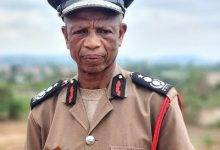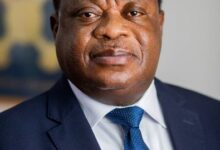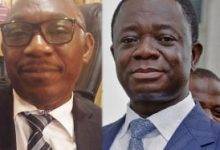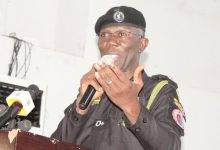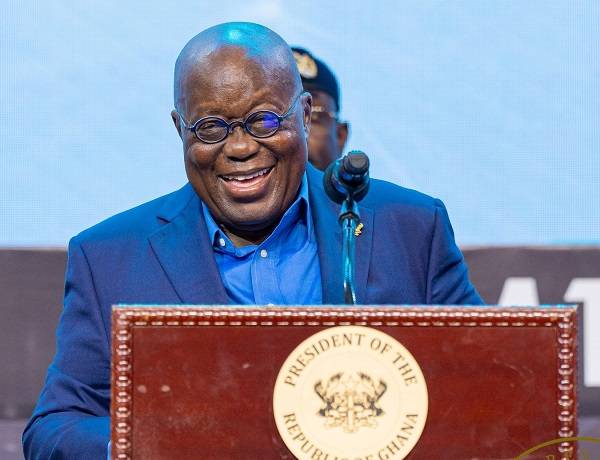
Today, we live in a probing and a highly conscious world. Young men and women are, absolutely, impatient, and rightly so. They demand for instant results. They want opportunities, and, like folks anywhere in the world, they demand the wherewithal to enable them look after their families and pursue a happy life.
Not long ago, the world went through, and to a large extent, is still going through some extraordinary turmoil, almost similar to the miseries of the Great Depression in the 1930s, or post World War II. With such difficulties, there is the need for a unique and inspirational leader, with unwavering courage and foresight, and who possesses some extraordinary attributes to help us work together to plough ourselves out of the quagmire back to normalcy. I dare say, most emphatically, that our country has had this in abundance in H.E. President Nana Addo Dankwa Akufo-Addo, who will turn eighty (80) years on 29th of March, this year. Glory be to God.

Tenacious, kind, a man of honour, forthright, decisive, visionary, courageous, and, mercifully and thanks to the Good Lord, strong at eighty (80), Nana Akufo-Addo is demonstrably a determined leader. He is a servant leader, and, put simply, a good and kind-hearted man.
Most people who have had the opportunity to come up close to President Akufo-Addo will find that he is driven by some of the noblest principles and character traits of good leaders. A noble man, who has served his country with a great sense of duty, patriotism and utmost integrity, whom, without a shred of doubt, history will be extremely kind to.
I have had the privilege and honour to know and work with President Akufo-Addo, as, in all modesty, one of his closest proteges for two decades. With a great sense of humour, President Akufo-Addo laughs hard. A kind man, whom, as Foreign Minister and opposition leader, I witnessed some of his aides conspire to prevent visitors from entering his office towards the close of day, because he would generously empty his pockets for them, obviously, to the detriment of the aides. Extremely hard working man who has transformed everyone who has ever worked with him into a “nocturnal being.” Strong-willed and courageous man who defied all manner of opposition to become a two-term President of our country. Happily, the concerted and well-orchestrated efforts by some of his opponents to caricature him as arrogant failed long ago, and, as the Ghanaian people have known him for years, he remains a decent and an extremely easy-going man. Loves small cars, not big ones. Given to modest houses, not huge ones. Prefers the simplest things of life as they come.

I recall a conversation with his beloved and devoted wife, First Lady Rebecca Akufo-Addo, when I asked her, “so how did the President take all the painful setbacks in his journey to our country’s presidency?” And she said to me, to my pleasant surprise: “he just moved on, picked up some lessons, and moved on.” “Nana Addo,” as she, affectionately, calls him, “Never cries over spilt milk.”
POLITICAL ACTIVISM
From his political activism in his youthful days in the late 1970s, as General Secretary of the People’s Movement for Freedom and Justice (PMFJ), which insisted on a democratic Ghana, opposing the military Government of Kutu Acheampong and the imposition of Union Government in 1978, through the establishment of his law firm, which was, and still is, one of the foremost human rights law firms in the country, to his human rights activism days, defending the politically oppressed, Akufo-Addo has shown to be a tenacious servant leader.
But his tenacity will even become more profound in the Fourth Republic. Against many odds, and amidst intimidation and opposition from the then Government, Akufo-Addo led what is, arguably, the biggest protest marches in the history of our country, the “Kumi Preko” demonstration, in 1995, at the height of the might of the Rawlings’ administration.
His determination to serve his country in her highest office led him to contest for the New Patriotic Party’s (NPP’s) presidential candidature in 1998, losing to the venerable Ghanaian Statesman, John Agyekum Kufour, who eventually won the general elections to become the second President of the Fourth Republic. President Kufour appointed Akufo-Addo, first, as Attorney-General and Minister for Justice, and, later, Minister for Foreign Affairs and Regional Integration, serving country and people diligently, dutifully and faithfully. His peers in the Government of President Kufour attest to his capabilities and leadership in the seven years he served alongside them. And as President Kufour once put it: “As Minister, he always entered my office with a notepad and pen in hand, and that is the measure of the man’s diligence and sense of duty.”
SERVICE AT HIGHEST LEVEL
Having served faithfully and conscientiously, he decided, once again, to serve at the highest level possible. He explained the rationale behind his decision to run for President in the following words:
“I left office in order to contest to win the NPP presidential nomination for the singular opportunity to serve the people of Ghana as their next leader. I come from a background where public service is considered a duty.” (A Brochure on Nana Akufo-Addo, 2007).
His message resonated with delegates, and he was elected the flagbearer of the NPP. Even though he won the first round of the 2008 General Elections by 49.32% to 47.76% for his closest contender, he narrowly lost the run-off by just some eighty thousand (80,000) votes, the closest presidential elections results in Africa. He showed leadership, and readily accepted the results, to the overall admiration of citizens and advocates of democracy. In a statement after the declaration of the results, then Candidate Akufo-Addo stated:

AS OPPOSITION LEADER
“This is today a divided country, and these times call for leadership from all of us so that we can build this country. Both Prof. Mills and I have an obligation to foster conciliation and consensus, and I pledge to do my part.” (Nana Congratulates Prof Mills, Modern Ghana, 4th January, 2009).
Such was his commitment to democracy in Ghana.
It is said that a single defeat is not a final defeat. Akufo-Addo did not give up. He launched a strong campaign in the lead up to the 2012 general elections, during which he reiterated his promise to ensure free Senior High School (SHS) education for all qualified Ghanaians. Political opponents derided the policy as a charade, a sham, a farce, fake and an empty promise to outwit Ghanaians. Some senior Government officials at the time, for example, said “Free SHS can only be possible in 2032, in 20 years time.”
Akufo-Addo lost the election to President John Mahama, but chose the constitutionally prescribed procedure to challenge the results at the Supreme Court. (See In re Presidential Election Petition; Akufo-Addo &Others v Mahama & Others (No. 4) [2013] SCGLR (Special Edition) 73). The case was decided by a 5-4 majority. Although he had the option to seek a review considering the margin, Akufo-Addo waived that right, even before the reasons for the decision were made public. In a profound address to a tensed nation on the precipice, he said:
“I accept that what the Court says brings finality to the election dispute. We shall not be asking for a review of the verdict so we can all move on in the interest of our nation. Everything in my bones, in my upbringing and in what I have done with my life thus far makes it imperative that I accept a decision made by the highest court of the land, however much I dislike or disagree with it. I am saddened by the verdict, and I know that many of our supporters are saddened too. However, for the sake and love of our country, we must embark on a path that builds, rather than destroys, to deal with our disappointment.”
Akufo-Addo’s democratic credentials before this famous statement had been very high; but I dare say this address to the nation, in the heady moments after the Supreme Court’s split decision, sealed his legacy as a quintessential Ghanaian statesman and democrat par excellence. The plaudits poured in like showers in the desert, to calm the heat and settle the dust-storms. The losing Candidate was hailed as the triumphant statesman.
The adulation may have helped to salve the pain of defeat somewhat; but it hurt all the same. This was the third setback in a row, two elections gone wrong, and a loss in a court case. He had come closest this time. Yet, you cannot roast a bird you almost killed. So, was he going to give up? Absolutely not! For as Maya Angelou famously remarked, “You may encounter many defeats, but you must not be defeated.” And so, the man came back, even stronger, and with the English proverbial bulldog determination, launched a much more relentless campaign, challenging the status quo, and convincing the populace that his policies for the nation was compelling, and, in particular, why free Senior High School was so fundamental for the long-term well-being of Ghana.
WINS PRESIDENTIAL ELECTION
Despite well-oiled opposition, the unrelenting Akufo-Addo did not capitulate; he ploughed on, campaigned and won overwhelmingly at the Presidential Elections in 2016, and for the first time in the history of our country, not only did he defeat an incumbent President, but he did so with a whopping one million (1,000,000) vote margin.
When the Indian lawyer and nationalist, Mahatma Gandhi, says “the history of the world is full of men who rose to leadership, by sheer force of self-confidence, bravery and tenacity,” Akufo-Addo is a perfect example. And as Lord Alfred Thompson Denning of Whitchurch said many years ago, the law, just like politics and governance, I submit, is for “Bold souls not timorous ones.”
On 7th January, 2017, Akufo-Addo was sworn into office, as the fifth President of the Fourth Republic. But how was he going to fare as President? Was he going to fulfil the promises he made prior to the elections, or he was going to behave like those leaders who forget all their promises after being elected? And if there was one promise the whole country looked up to, it was the promise to provide Free SHS for all qualified students. When was he going to start this, and where was he going to get the money from? The questions were unending.
According to the 32nd President of the United States, Franklin D. Roosevelt, “Democracy cannot succeed unless those who express their choice are prepared to choose wisely. The real safeguard of democracy, therefore, is education.” Indeed, education has, rightly, been described as the currency for democracy and development. This was never lost on President Akufo-Addo. In his inaugural speech as President, he said, “We must create wealth and restore happiness to our nation. We can only do this when we have an educated and skilled population that is capable of competing in the global economy.”
FREE SHS POLICY
With this in mind, work on Free SHS commenced immediately after being sworn into office. In his view, the country could not afford to wait another year where people are denied SHS education because of poverty. The implementation of the policy could not, therefore, wait even for a year. Resistance to the policy, however, continued unabated. A senior member of the opposition party declared that the NDC will fiercely resist Free SHS.
There were concerns about the cost to Government, but President Akufo-Addo was prepared to implement the policy despite budgetary constraints. At the launch of the Free SHS policy on Tuesday, 12th September, 2017, he said:
“Leadership is about choices – I have chosen to invest in the future of our youth and of our country.”
This resonates with Franklin Roosevelt’s caution that, “The school is the last expenditure upon which America [insert Ghana] should be willing to economise.” According to President Akufo-Addo, “knowledge and talent are not for the rich and privileged alone, and that free education widens the gates of opportunities to every child, especially those whose talents are arrested because of poverty.”
To the amazement of many, including political opponents and some within his own party, and the excitement of majority of Ghanaians, the first batch of the Free SHS students enrolled in SHSs across the country. To ensure that poverty did not become a hindrance, not only was tuition made free, but additional fees for admission, textbooks, library, science centre, ICT, examination, utility, boarding, and meals, were all made free. On top of that, day students would receive one hot meal a day.
Prior to the introduction of the policy, on the average, each year, over twenty-seven percent (27%) of Junior High School graduates who were placed in Senior High Schools could not enrol, largely due to poverty. In the first year of the implementation of the policy, alone, this number was more than halved. Today, enrolment rate at the SHS is over ninety percent (90%), and the number of students in SHS across the country has almost doubled from eight hundred and thirty thousand (830,000) in 2016 to over one point four-five million (1,450,000) in 2024, one of the highest enrolment rates in Africa and, indeed, the world.
Contrary to suggestions that Free SHS would collapse the education system and lower standards, the results of Free SHS students have shown the direct opposite. For example, the first batch of the Free SHS students, who wrote the 2019/2020 West Africa Senior School Certificate Examination (WASSCE), produced the best Mathematics results in the last decade and one of the best in the history of WASSCE in the country. That year, our country recorded the best Tertiary Education Qualifying Grades (TEQG) in the preceding five years of the WASSCE, and a 12.7 percentage increase from the 2016 performance for all four core subjects. (Armah & Amankwa, 2020).
This sterling performance has continued to improve throughout the implementation of the policy. For instance, the 2022 WASSCE results showed that the number of candidates obtaining TEQG for English Language increased from 54.08% in the previous year to 60.39%, while that of Mathematics and Social Studies increased from 54.11% to 61.39% and 66.03% to 71.51%, respectively (WAEC, 2022). And for 2023, the Ghana Education Service reports that the results of the WASSCE is the best in the last decade, with Ghana topping the WAEC International Excellence Awards for the five participating countries, with products of Free SHS sweeping all three awards.
Today, due to the foresight and perseverance of President Akufo-Addo, not only are our young ones getting free Senior High education, they have, also, seen improved infrastructure, and are producing remarkable grades at the end of their studies. And to crown it all, on Monday, 25th March, 2024, President Akufo-Addo launched the transformational One Student One Tablet intervention, where some 1.3 million Ghanaian students are set to receive tablets fitted with digital content to aid in research, teaching and learning. Outstanding. The impact of these investments will, no doubt, become manifest in the adult lives of the beneficiary cohorts of the Free SHS policy, and the lives of their children. This is the mark of a far-sighted servant leader, one who recognises human capital as a nation’s most valuable natural resource.
1D1F
While delivering on this flagship programme, President Akufo-Addo was delivering on other promises such as the One District One Factory, Planting for Food and Jobs, robust infrastructure, and at the same time, turning the fortunes of the economy around. Ghana became one of the fastest growing economies, with GDP growth increasing from 3.4% in 2016 to an average of 7% between 2017 and 2019. Inflation hit its lowest level since the beginning of the fourth Republic in January 2020, at 7.8%, fiscal deficit was kept below 5% for three consecutive years, and the annual average depreciation of the cedi was at its lowest for any Government in its first term (State of the Nation Address, 2020).
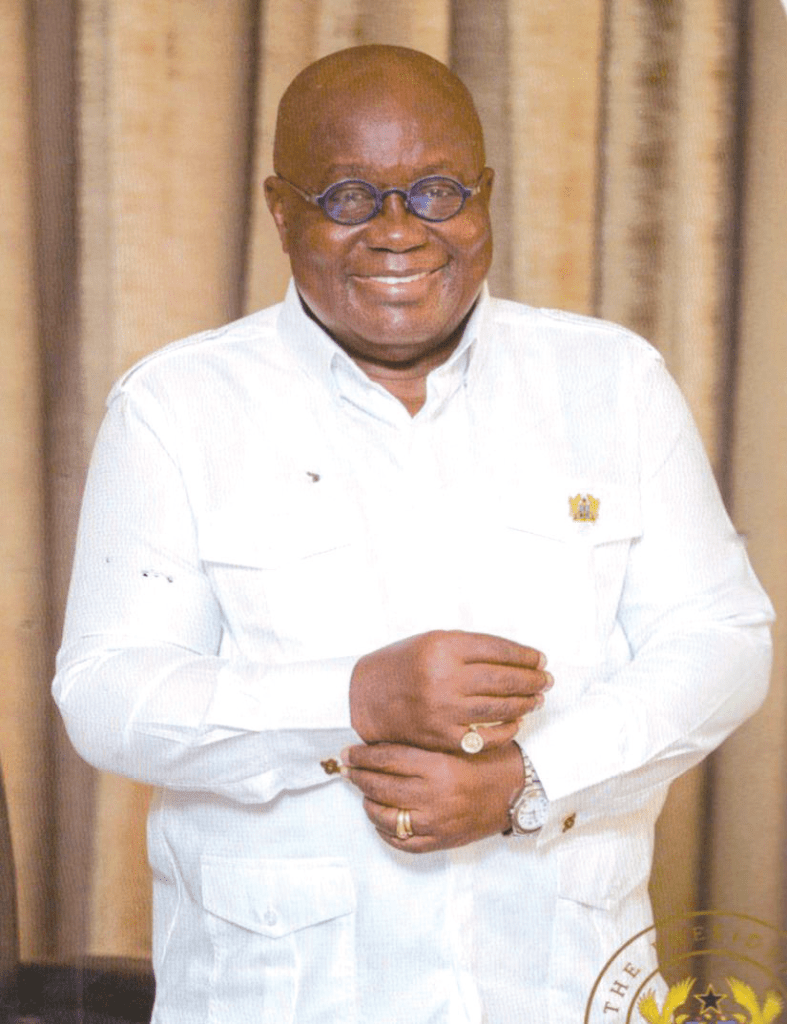
COVID-19 PANDEMIC
Unfortunately, the Covid-19 Pandemic struck. The world was, literally, shut down, people were dying in hundreds of thousands across countries, including those with the most advanced healthcare system, and there were predictions that dead bodies would be littered on the streets of Accra, and other Ghanaian cities and towns. Such a terrifying and alarming time called for strong leadership and, again, President Akufo-Addo stood out. Painfully, he closed our borders, locked down parts of the country, and mobilised the entire nation to fight the virus, amidst regular, rallying nationwide radio and television addresses, which became famously referred to as “Fellow Ghanaians” broadcasts.

FELLOW GHANAIANS
To ensure that the lives of the most vulnerable were protected, free meals, masks and medical supplies were supplied to the neediest. The general population received free water supply and electricity. More than thirty-eight thousand (38,000) nurses were hired and Thirty-Six Million Ghana Cedis (GHS36,000,000.00) in tax exemptions were granted to frontline workers. (2022 Budget Statement, pars. 9 and 10).
These investments towards saving lives paid off, and many lives were saved. Ghana’s response to the pandemic received praise from across the world, including the Director-General of the World Health Organisation, the Chairperson of Global Public Health, and several international public health and media pundits. As one author observed, President Akufo-Addo’s “contextually relevant communication approach, coupled with his swift, pre-emptive and decisive measures helped him establish his leadership in handling the pandemic, ensure public safety and endear himself not only to Ghanaians but also to the rest of the world. (Lilleker 2021, 301). Others described his approach as “a good example for other African countries and the world at large.” (Antwi-Bosiako 2021, 136)
Never before in our country’s sixty-seven years of nationhood have we seen this scale of logistical and personnel mobilisation to confront a ferocious, monstrous and all-consuming virus. As a student of political history, it reminds me of how Winston Churchill mobilised British citizens during the Second World War, with his famous words, “I have nothing to offer but blood, toil, tears and sweat.” A deadly and cruel virus, obviously, must be fought with our blood and sweat, and it took the decisive and focused servant leader, President Akufo-Addo to lead this charge.
As a public health threat, the battle against COVID-19 can be said to have been won; but the pandemic brought the Ghanaian economy to its knees. It disrupted all the economic gains made in the first three (3) years of the Akufo-Addo administration. But this was not peculiar to Ghana. The International Monetary Fund (IMF) said economic recession during the pandemic was the worst since the Great Depression (https://www.imf.org/en/Blogs/Articles/2020/04/14/blog-weo-the-great-lockdown-worst-economic-downturn-since-the-great-depression). World economic activity is said to have shrunk by 6.5% (Gordon Brown, Seven Ways to Change the World: How to Fix the Most Pressing Problems We Face, 81). Among the G7 countries, for example, GDP fell by 3.5% in the United States, 5% in Germany, 8.3% in France, 8.9% in Italy, 5% in Canada, 5.6% in Japan, and 9.9% in the United Kingdom, with the UK’s economic downturn being the worst since the Great Frost in 1709 (The Guardian, 12th February, 2021).
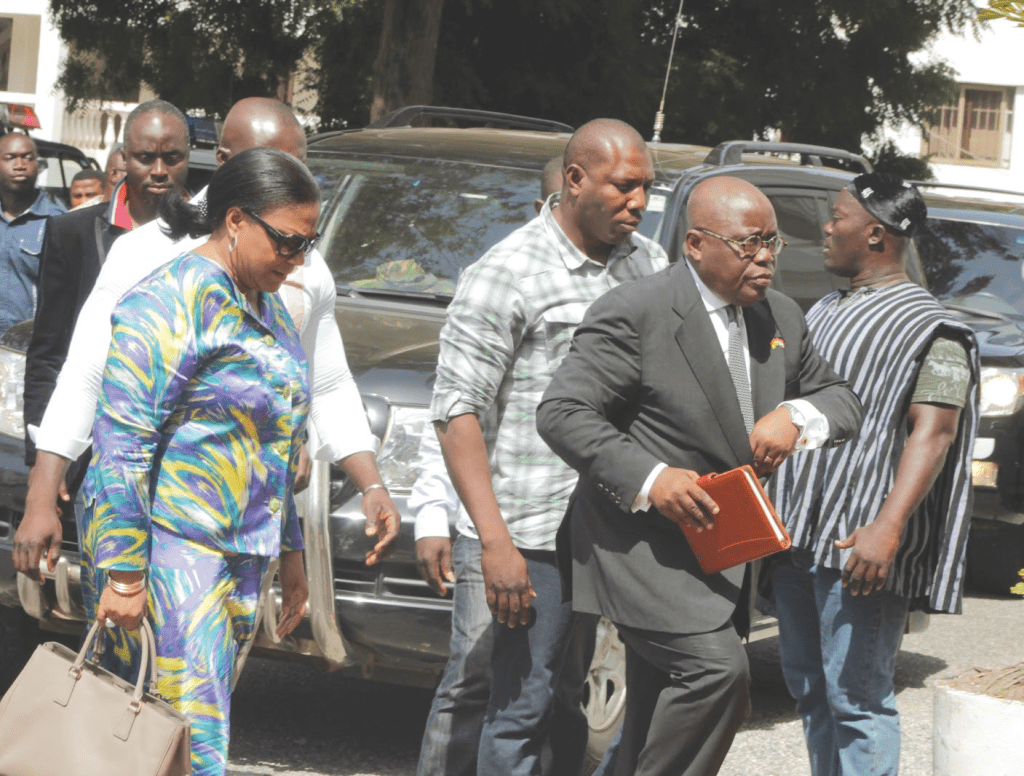
Ghana, not being an island, had its own share of this global crisis, with GDP growth falling from 6.5% in 2019 to 0.5% in 2020 (2023 Budget, par. 74).
ECONOMIC RECOVERY PROGRAMME
But President Akufo-Addo presented a robust and transformational programme for economic recovery, through the Coronavirus Alleviation Programme (CAP). Under the Coronavirus Alleviation Programme Business Support Scheme (CAPBuSS), for example, concessionary loans worth over Five Hundred and Twenty Million Ghana Cedis (GHS520,000,000.00) were provided to some 300,000 businesses, and over Forty-Four Million Ghana Cedis (GHS44,000,000) to Small, Micro and Medium Enterprises (2023 Budget, par. 607).
Great leaders see opportunity, even in the midst of misfortune. Amidst the pandemic, the idea of Agenda 111 was birthed, to construct 101 District Hospitals in Metropolitan, Municipal and District Assemblies (MMDAs) without District Hospitals, seven Regional Hospitals, two new psychiatric hospitals, and the rehabilitation of the Accra Psychiatric Hospital. Today, 91 of the 111 hospitals are under construction, and are at different stages of completion, with majority of them set to be ready before the end of the year.
With these measures in place, the economy had begun to bounce back, and by the end of 2021, GDP growth had moved from 0.5% in 2020 to 5.1% (2024 Budget, par. 104). Unfortunately, while we were yet to realise the full benefits of this transformational programme, Russia invaded Ukraine, sending the global economy into a tailspin. Even in the most developed economies, fuel prices hit an all-time high; there were gas shortages; baby milk, vegetables and fruits were being rationed; workers in Europe were laying down their tools; families in Australia were giving away their pets because they could not afford to feed them; and, some countries were plunged into darkness for lack of electric power.
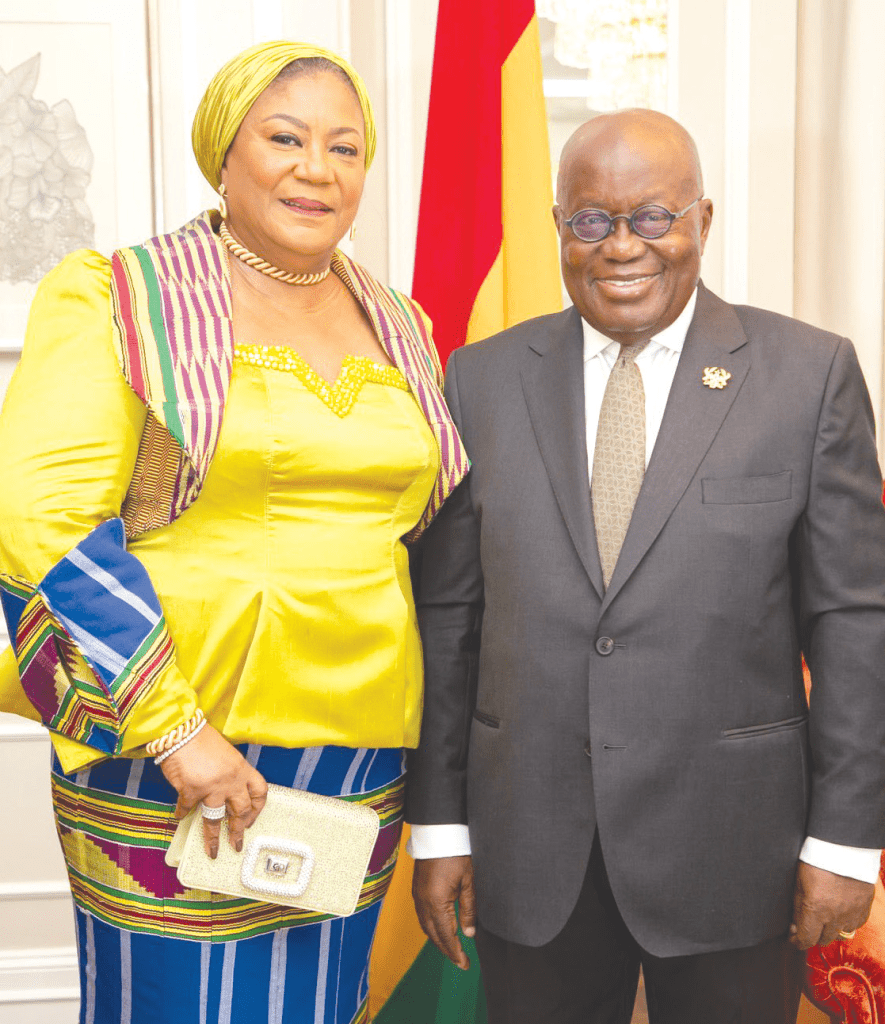
That this crisis is attributed to the Russian – Ukraine war is not in doubt. It “pushed up the costs of other goods and services throughout global supply chains” (Guan 2023), and we had our own share of the crisis. However, unlike other countries, we did not have to ration food, we did not have shortages of fuel and gas, our electric power supply was, largely, uninterrupted, and Government’s flagship programmes, including the Free SHS, Agenda 111 and the construction of roads, continued unabated. And to fast-track recovery, innovative policy measures were rolled out, including the Domestic Gold Purchase Programme, and the Gold for Oil Programme, through which we shored up our reserves and stabilised fuel prices as well as our currency.
POST COVID-19 PROGRAMME
Today, with the support of the IMF, Government is implementing a Post COVID-19 Programme for Economic Growth (PC-PEG), to restore macroeconomic stability and debt sustainability, build resilience through the implementation of wide-ranging and strong structural reforms, and lay the foundation for stronger and more inclusive growth, while also protecting the poor and the vulnerable, and already, significant progress has been made.
Yes, undoubtedly, we are not out of the woods yet. But let us face it, the truth, also, is that there are glimpses of hope, as we have begun witnessing some modest gains. Momentum is building up, and we have clearly turned the curve. Despite projections that our economy was going to grow at 1.5% in 2023, the economy grew by 2.9% (https://www.graphic.com.gh/business/business-news/ghanas-economy-grew-by-2-9-in-2023.html), nearly double the projection. Inflation has dropped from 54.1% at the end of 2022 to 23.2 as at March, 2024 (Bank of Ghana). The cedi has, largely, stabilised, and we recorded a surplus trade balance as at August, 2023. (2024 Budget, pp. 43). This is in accord with what President Akufo-Addo said in his “Fellow Ghanaians” broadcast of 28th March, 2020, when he said:
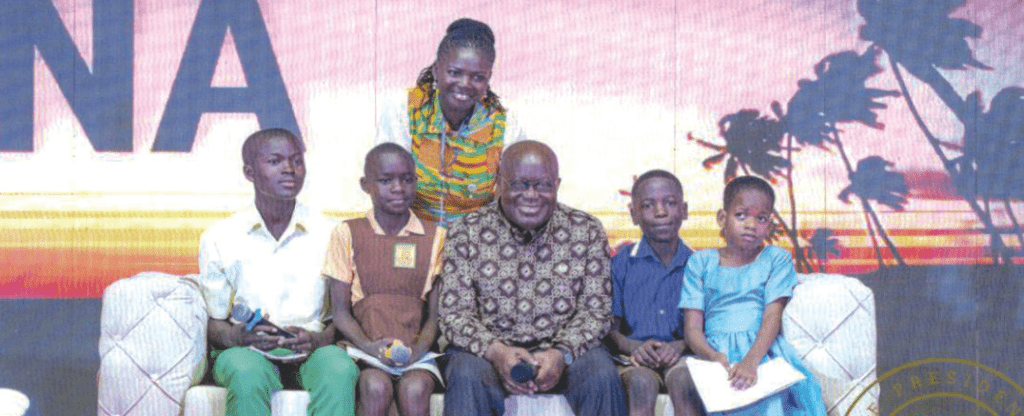
… as we have demonstrated over the course of the last three years, where we inherited an economy that was growing at 3.4% and transformed it into one which has grown by an average of 7% over the last three (3) years, I assure you that we know what to do to bring back our economy back to life. What we do not know how to do is to bring people back to life.”
GREAT VISIONARY, PURPOSE LEADER
So, what is the verdict on President Akufo-Addo’s leadership? Undoubtedly, the verdict is overwhelmingly positive. I submit that he has proven to be a great visionary, and a purposeful servant leader of integrity. But for those who will disagree with me, as I know there are a good number in the country, I, respectfully, say that history will be the best judge. The jury is still out there, but the overwhelming evidence and volume of work done in these seven (7) years will mean that history will be extremely kind to Akufo-Addo.
History is replete with examples of leaders whose policies and programmes were, at the time they were being implemented, criticised by, with respect, people who did not look into the future, and yet, were later vindicated. Abraham Lincoln and Harry Truman of the United States, the UK’s Winston Churchill, and Ghana’s President Kufour, are just a few examples. As our Former Prime Minister, Dr. Kofi Abrefa Busia remarked at his investiture on 1st October, 1969:
“When the hand of Providence makes us participants in great and historic events, we find ourselves too close to them, or too engrossed in them to realise their full significance. It is only given to those who in the hindsight of history can see such events in a larger perspective to appraise them fully.”
Among many factors and extraordinary developments, Free SHS, alone, cements President Akufo-Addo’s legacy as an outstanding and transformative Ghanaian and African leader. Just as it happened in America, China, and other parts of the world, generations of Ghanaians will be highly indebted to this Akufo-Addo’s transformational policy.
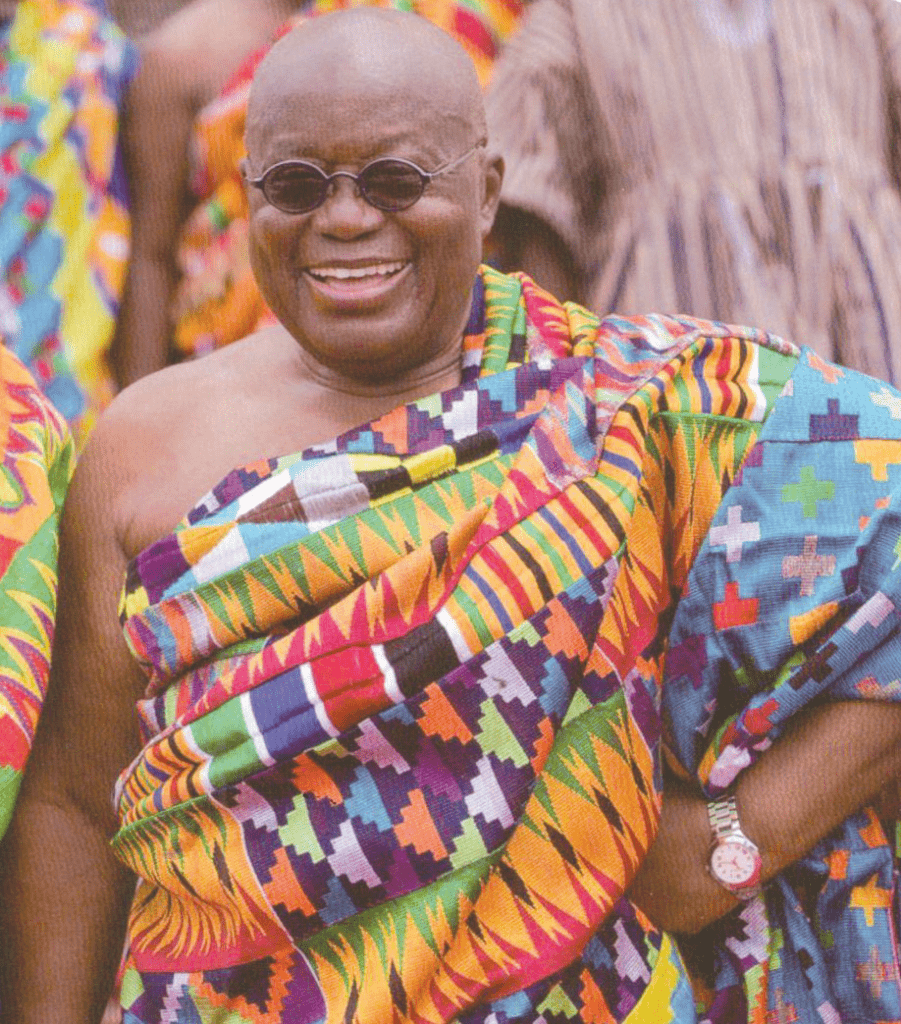
HONOUR TO SERVE NATION
On the occasion of his eightieth (80) birthday, it is with great honour, pride and privilege that I have known and, so closely, worked with him, first, in many political struggles, some resulting in pain and others in triumph. Above all, I thank President Akufo-Addo, most sincerely, for the rare and great opportunity he has given me to serve my nation, through him, as President. The tutelage and mentorship he has so graciously given me is, and continue to be, invaluable.
President Akufo-Addo, that young man who, at the age of thirty-four (34), was the General Secretary of the Peoples’ Movement for Freedom and Justice, and fought gallantly on the side of great giants like General Akwasi Amankwa Afrifa, William Ofori-Atta, and Prof. Albert Kwadwo Adu Boahen, to defeat Acheampong’s Union Government; who became a celebrated human rights activist, and astute constitutional lawyer; who battled the Rawlings regime in the early heady days of the Fourth Republic; who since 1998 sought to become President, and eventually succeeded nearly two decades later; who is serving his second term, and prosecuting some of the boldest, transformative and ambitious policies our country has ever witnessed; and who, today, thanks be to God, is strong at eighty (80), is indeed, a tenacious servant leader, and history will be extremely kind to him, and deservedly so.
Happy 80 birthday, Sir.
Hon. Samuel A. Jinapor, MP
Minister for Lands and Natural Resources
Member of Parliament for Damongo Constituency
BY SAMUEL A. JINAPOR, MP

